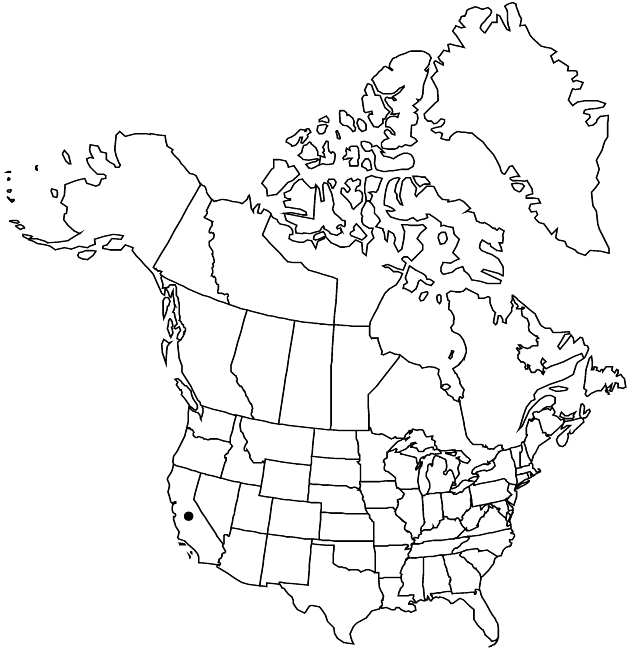Difference between revisions of "Blepharizonia laxa"
Bull. Calif. Acad. Sci. 1: 279. 1885.
FNA>Volume Importer |
FNA>Volume Importer |
||
| Line 14: | Line 14: | ||
|name=Blepharizonia plumosa subsp. viscida | |name=Blepharizonia plumosa subsp. viscida | ||
|authority=D. D. Keck | |authority=D. D. Keck | ||
| − | }}{{Treatment/ID/Synonym | + | }} {{Treatment/ID/Synonym |
|name=Blepharizonia plumosa var. subplumosa | |name=Blepharizonia plumosa var. subplumosa | ||
|authority=(A. Gray) Jepson | |authority=(A. Gray) Jepson | ||
| Line 32: | Line 32: | ||
|elevation=0–1500 m | |elevation=0–1500 m | ||
|distribution=Calif. | |distribution=Calif. | ||
| − | |discussion=<p>Blepharizonia laxa occurs widely in the Inner South Coast Ranges (rarely in the Outer South Coast Ranges) north to the eastern San Francisco Bay area and northwestern San Joaquin Valley. Most recent workers have treated the taxon as a subspecies or variety of B. plumosa; following B. G. Baldwin et al. (2001), we recognize B. laxa at species rank based on molecular and biosystematic evidence for extensive evolutionary divergence. Where B. laxa and B. plumosa co-occur, the two species remain distinct and appear to be ecologically divergent, in addition to being only minimally interfertile (Baldwin et al.).</p> | + | |discussion=<p><i>Blepharizonia laxa</i> occurs widely in the Inner South Coast Ranges (rarely in the Outer South Coast Ranges) north to the eastern San Francisco Bay area and northwestern San Joaquin Valley. Most recent workers have treated the taxon as a subspecies or variety of <i>B. plumosa</i>; following B. G. Baldwin et al. (2001), we recognize <i>B. laxa</i> at species rank based on molecular and biosystematic evidence for extensive evolutionary divergence. Where <i>B. laxa</i> and <i>B. plumosa</i> co-occur, the two species remain distinct and appear to be ecologically divergent, in addition to being only minimally interfertile (Baldwin et al.).</p> |
|tables= | |tables= | ||
|references= | |references= | ||
| Line 56: | Line 56: | ||
|publication year=1885 | |publication year=1885 | ||
|special status= | |special status= | ||
| − | |source xml=https://jpend@bitbucket.org/aafc-mbb/fna-data-curation.git/src/ | + | |source xml=https://jpend@bitbucket.org/aafc-mbb/fna-data-curation.git/src/8f726806613d60c220dc4493de13607dd3150896/coarse_grained_fna_xml/V19-20-21/V21_712.xml |
|tribe=Asteraceae tribe Heliantheae | |tribe=Asteraceae tribe Heliantheae | ||
|subtribe=Asteraceae (tribe Heliantheae) subtribe Madiinae | |subtribe=Asteraceae (tribe Heliantheae) subtribe Madiinae | ||
Revision as of 16:36, 18 September 2019
Herbage yellowish green, usually densely stipitate-glandular distally and with scattered to abundant tack-glands. Heads usually borne singly or in ± racemiform-paniculiform arrays (branches ± virgate). Involucres ± glabrate or hirsute to hispid, usually with scattered to abundant tack-glands as well. Disc pappi 0 or 0.1–1 mm. 2n = 28.
Phenology: Flowering Jul–Nov.
Habitat: Openings in woodlands, chaparral, grasslands
Elevation: 0–1500 m
Discussion
Blepharizonia laxa occurs widely in the Inner South Coast Ranges (rarely in the Outer South Coast Ranges) north to the eastern San Francisco Bay area and northwestern San Joaquin Valley. Most recent workers have treated the taxon as a subspecies or variety of B. plumosa; following B. G. Baldwin et al. (2001), we recognize B. laxa at species rank based on molecular and biosystematic evidence for extensive evolutionary divergence. Where B. laxa and B. plumosa co-occur, the two species remain distinct and appear to be ecologically divergent, in addition to being only minimally interfertile (Baldwin et al.).
Selected References
None.
